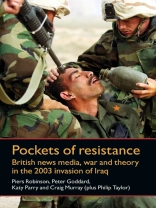For scholars of media and war, the 2003 invasion of Iraq is a compelling case to study. As part of President Bush’s ‘war on terror’, the invasion was the most controversial British foreign policy decision since Suez, and its ramifications and aftermath have rarely been far from the news. In the many political and public debates regarding this conflict, arguments over the role of the media have been omnipresent. For some, media coverage was biased against the war, for others it became a cheerleader for the invasion. Where does the truth lie? Drawing upon a uniquely-detailed and rich content and framing analysis of television and press coverage, and on interviews with some of the journalists involved, Pockets of Resistance provides an authoritative assessment of how British news media reported the 2003 Iraq invasion and also of the theoretical implications of this case for our understanding of wartime media-state relations.
Pockets of Resistance examines the successes and failures of British television news as it sought to attain independence under the difficult circumstances of war, and describes and explains the emergence of some surprisingly vociferous anti-war voices within a diverse national press.
Содержание
Preface and acknowledgments
1. Introduction
2. Mobilising for battle: The news media and war from Vietnam to Iraq
3. Theorising and analysing media performance in wartime
4. Placing coverage of the invasion in context
5. ‘Supporting our boys in battle’: Evidence for supportive coverage and the elite-driven model
6. ‘Independence, diversity and professional autonomy’: Evidence for negotiated and oppositional coverage
7. Case studies from the invasion of Iraq: Jessica Lynch, Ali Abbas and the anti-war movement
8. Conclusion: Patterns of support, negotiation and opposition
Bibliography
Appendices:
A. Further information about the content and framing analysis
B. Examples of the detailed criteria provided to coders for assessing thematic frames
Об авторе
Craig Murray is head of Media Analysis at Opoint AS, Norway












